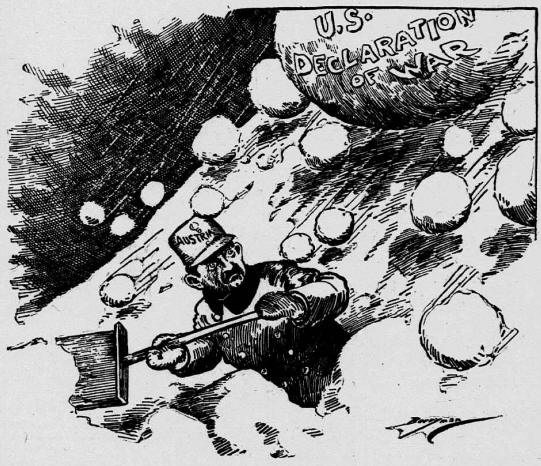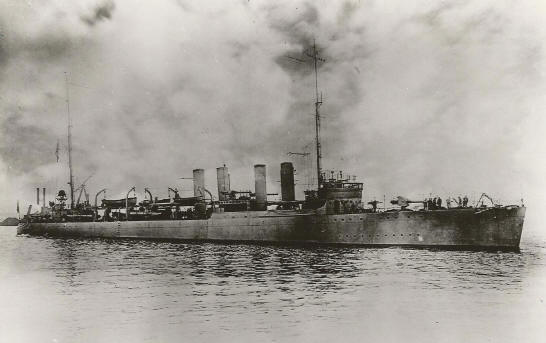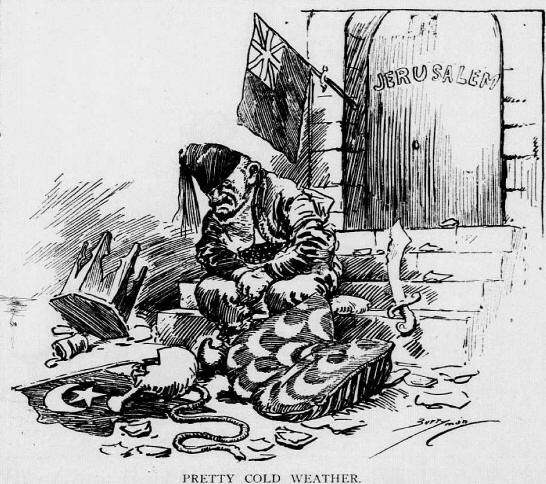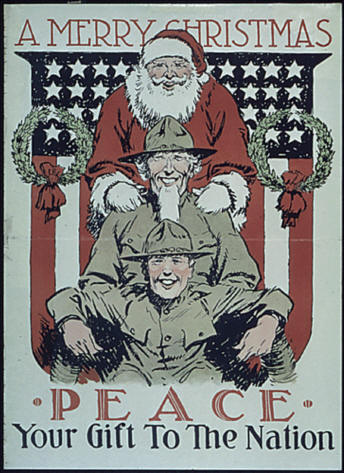December 1917
December 7
America Declares War On Austria-Hungary
President Wilson, in his annual message to Congress, recommended America immediately declare war against the Austria-Hungarian Empire. The same logic would lead also to a declaration of war against Turkey and Bulgaria, but they are the mere tools of Germany and do not yet stand in a direct path of our necessary action, he
said.
"Peace," the President declared, "could come only when the German people elect rulers that the world can trust; when they make reparations for the destruction that their present rulers have wrought, and when Germany recedes from all the territory acquired in armed conquest."
The President said he did not wish to rearrange the Austria-Hungarian Empire. He hopes to secure, he said, for the people of the Balkan Peninsula and for the people of the Turkish Empire, the right and opportunity to make their own lives safe and secure against oppression and injustice and from the distraction of foreign
courts or parties.
Following the President’s speech, a resolution for war against Austria-Hungary was introduced in the House of Representatives. It provided a declaration that a state of a war exists due to Austria-Hungary’s warlike acts against the United States and her support for Germany.
The declaration of war on Austria is regarded as a signal for the extension of America’s help to hard-pressed Italy. With the declaration of war against Austria, America is free to assist Italy in the fullest sense.

Germans Open New Italian Offensive
The Austrian & German push to break through to Venice is evidently underway, but the Italians are standing the shock well. The fighting has been extremely heavy, with masses of infantry engaged in hand-to-hand combat. The first attack on the Italian left was met and repulsed with large enemy casualties. The main attack on the
Italian right was contested for 36 hours. The Italians inflicted heavy losses before yielding ground.
Italian aviators had reported heavy concentrations of Austrian and German divisions behind the lines of the invaders, and official dispatches express the opinion that the objective of the new offensive is the plain between Venice and Verona, and eventually Venice itself.
Germany And Bolsheviks Sign Armistice
An armistice, signed by the emissaries of Austria, Germany and the Bolsheviks at Brest-Litovak, is in force on the Eastern front in Galicia and northward. The request of the Bolsheviks delegation that all the belligerents be asked to take part in reaching an armistice on all fronts was refused by the Germans, who proposed that
the armistice affect only the front lines between the Baltic and Black seas.
The Russians said they were treating for an armistice on all fronts with a view of the conclusion of a general peace. The Russian Provisional Government however, now at war with the Bolsheviks, said that no separate peace will be tolerated and that its armies under Gen. Dukhonin will fight on.
As part of the armistice, the Bolsheviks demanded that the Germans agree not to take any troops from the Eastern Theater to other fronts and to evacuate the islands in the Gulf of Riga near their headquarters at Petrograd.
Berlin’s terms called for the creation of a Kingdom of Poland as a buffer state, which will be administratively dominated by Prussian influence. Germany also demanded the formation of new autonomous states of Estonia and Lithuania and that Finland be allowed to decide her own fate, which decision is certainly to be for an
autonomous republic.
The Provisional government’s Russian ambassador in London, said that it was only a matter of a few weeks, when the Bolsheviks will be completely repudiated, and the forces in southern Russia, which is overwhelmingly opposed to a separate peace, and controls the supplies, are working quietly but surely in the right direction.
The fact that the embassy’s staff in London carries on routine work with the Dukhomin headquarters indicates that there is no intention to recognize the Petrograd usurpers.
Romania, meanwhile, has sided with the Bolsheviks on the proposed armistice. The Romanian government was forced to enter the armistice negotiations with the Germans as a result of an ultimatum from the Bolsheviks who threatened to withdrawal Russian troops from the Moldavian front and stop the export of food and war materials.
American Troops Receive Christmas Gifts
American troops are beginning to receive Christmas packages from home, and American bound mail with packages and gifts from the soldiers are going in the other direction. If these are not as numerous as friends and relatives expect, it is because the soldiers are not all able to visit the larger towns and make purchases of the
articles permitted. All who can, however, are taking advantage of the opportunity to send something home from France.
In one town held by the Americans, six sacks containing gifts were delivered. The contents of most of them consisted of packages of various sizes. Some of the packages had written on them, "Open at Christmas" and similar inscriptions. The American Post Office has made every effort to keep the mail moving from them to the
positions where the addressees are quartered. Many of the offices are small, and it is feared unless they are constantly kept clear, they would soon be congested as a result from the heavy Christmas mail that is expected.
December 14
U.S. Destroyer Sunk
The American destroyer Jacob Jones, one of the newest and largest submarine hunters of her class, was sunk Thursday night with the loss of two thirds of her crew. This is the first naval loss of great consequence since the country entered the war.

The attack was delivered by torpedo. In the rolling icy waters of the North Atlantic winter weather the submarine had plenty of opportunity to pick her time for the shot. The submersible probably came upon the destroyer patrolling her course in the dark and as a result had the best of the engagement.
The Jones was one of the newest and largest American destroyers, with the displacement of 1,150 tons and a length of 310 feet. She was completed in 1916 at the New York Shipping Company, Camden New Jersey. The large loss of life would indicate that the torpedo, with its deadly charge of high explosives, made a fair hit on the
destroyer’s thin hull, and the submarine hunter probably was blown in two. That she probably went down like a rock is evidenced by the fact that nothing is said of survivors making it to lifeboats.
The survivors of the Jones undoubtedly owe their lives to the forethought of the Navy Department in having provided every destroyer with life rafts sufficient for the entire crew. They are lashed on the decks in such fashion that they release themselves and come to the surface if the ship sinks. Destroyers cannot carry enough
lifeboats for their complement without masking the fire of their guns and torpedoes.
Navy officers took pride in the fact that the Jones and her crew had recently written new honors into Navy records before the vessel fell victim to a torpedo. In October, the Jones went to the rescue of the British cruiser Orama when she had been torpedoed. The Jones raced to the stricken cruiser as she began to settle and
transferred all on board to her own decks, in doing so saving 305 British seamen.
Jerusalem Falls, Ends Turk Plan To Seize Suez Canal
The capture of Jerusalem by British forces marks the end of more than 1,200 years of the seat of the Christian religion being held by the Mohammedans. For 673 years the Holy City has been in undisputed ownership of the Turks, the last Christian ruler of Jerusalem being the German Emperor Frederick the Second, whose short-lived
dominion lasted from 1229 to 1244.
The fall of Jerusalem marks the definitive collapse of the long protracted effort of the Turks to capture the Suez Canal and invade Egypt. In November 1914, a Turkish army marched on the Suez Canal and succeeded in reaching within striking distance of the great artificial waterways, before being pushed back. In 1915 the Turks,
with German backing, reached as close as 85 miles east of the canal, but again were beaten back. In 1916 the Turks again advanced on the canal, reaching within fifteen miles of it. Here they were decisively defeated and driven out of Egypt, and the British forces crossed the border into Palestine.

On March 5th of this year, the British captured Hebron, fifteen miles south of Jerusalem. The campaign, however, lapsed into stagnancy due to the heat of the summer, but was renewed with a setting in of cool weather this fall.
By November, Gaza was in the hands of the British. General Allenby, the British commander, kept his forces near the coast, and in rapid motions pushed on to Jaffa - the Port of Jerusalem. By November 22nd the British were within five miles of Jerusalem, cutting the city virtually off on all sides but the East. Few details have
come through since that date, but the encircling movement must have been carried out with considerable speed, resulting in the surrender of the city.
Jerusalem contains about 60,000 inhabitants and is the home of pestilence, filth and fevers, but in historic interest it naturally surpasses, to Christians, all other places in the world. Since the days when Joshua wrestled it from the hands of the Jebusites, making it the capital of the Jewish race, Jerusalem has been the
prize and prey of half the races of the world. It has passed successfully into the hands of the Assyrians, Babylonians, Greeks, Romans, Persians, Arabs, the motley crowds of the Crusaders, finally to fall before the Turks.
Resistance To Bolsheviks Grows
Fears that the Bolsheviks will dissolve a Constituted Assembly are expressed in manifestoes issued by various non-Bolshevik Socialist bodies. The Central Committee of most of the Socialist organizations and the Executive Committee of the Peasants’ Deputies have issued an address to the public, wherein they say: "Only the
immediate conclusion of peace can save Russia from political and economic ruin and civil war, and preserve the acquisitions of the revolution, but it must be a stable peace, guaranteeing the economic and political independence of Russia, and the interest of the revolution. It must not be a separate peace, but a general. Nevertheless the Bolshevik
government began negotiations for a separate armistice without awaiting the decision of the Constituted Assembly, without the approval of the people, without any control on the part of the people, without consulting other parties, without awaiting the replies of our allies, and therefore, the armistice signed by the Bolsheviks is invalid and should
be opposed."
Russian officials in London, who are in direct communications with leaders of the Democratic organizations in Russia, declare that the movement to overthrow the Bolsheviks was supported not only by the Cossacks, but by almost all the leaders of the other parties. These leaders, it was said, are confident that they will be able
to make short work of the Bolsheviks. It is said that the ranks of the anti-Bolsheviks will soon number in excess of 400,000 Cossacks.
December 21
Ukraine Secedes From Russia
Dispatches from Petrograd throw little light on the military situation in southern Russia. Official statements issued in Petrograd are confusing and there are various reports regarding General Korniloff, the principle leader of the anti-Bolshevik troops whose present whereabouts and fortunes are not known definitively. The fog
of war has settled all over Russia, says the Petrograd correspondent of the Post, although very little actual warfare has developed.
The Germans had already begun to obtain fats and other sorely needed supplies from Russia, according to information reaching Petrograd. It was announced that credit institutions here have been formed and that trade has been resumed with the Germans. New shops have been opened and Germans are exchanging metals and chemicals for
vegetables and fats, especially soap.
Force is the only law in Russia today, and the strongest force for the moment is wielded by the Bolsheviks, who, under the guidance of Lenin and Trotsky are said to have established a despot regime against which many other Socialists are murmuring. Lenin is an invisible mystery, inaccessible and closely guarded, having given
up making speeches and now shunning publicity. Trotsky, on the other hand, speaks frequently and is very accessible.
Virtually every newspaper in Russia has been suppressed except those favoring or controlled by the Bolsheviks. The Railway Union, heretofore more or less neutral, has now been brought under Bolshevik influence.
The Rada, the governing body of the Ukraine, gave a negative answer to the ultimatum issued to it by the Bolshevik government demanding that within 48 hours it cease assisting Gen. Kaledines and to disarm all anti-Bolshevik troops in the Ukraine. In case of refusal, the Bolsheviks said that they would consider themselves in a
state of war with the Ukraine. In its reply, the Ukrainians proclaimed they were forming a Democratic Republic and intended to join the anti-Bolshevik Russian Federal Republic.
Bolshevik newspapers are complaining that the presence of the Allied military missions in Ukraine is encouraging General Kaledines, leader of the counterrevolution, against the Bolshevik government.
As a result of the armistice between the Germans and the Bolsheviks, the Bolsheviks have been able to move divisions from the northern front against Gen. Kaledines, who is reported to be gaining new successes daily. It is also reported that Romanians on the southwestern Russian front have joined the Ukrainians in their fight
against the Bolsheviks.
Meanwhile, it is reported that German railway traffic through the Rhine towns has been congested for several days, owing to the flow of troops and artillery being rushed from the Russian front to the Western front. Whereas the recent Italian victories excite little enthusiasm in Germany, the potential of success on the Western
front is causing the greatest joy in the German people. Reports indicate that the Germans are about to undertake, in the West, the greatest offensive campaign of the war with the goal of breaking the Allied lines and finally reaching the Atlantic.
Italians Sink Two Austrian Battleships
Two Italian torpedo boats made a daring raid into the inner harbor at Trieste, Sunday night, and torpedoed and sank two Austrian battleships. The raid was planned when it was learned that the Austrians were preparing to send the ships, with their 240 mm guns, to bombard the Italian coastal positions.
By slow and silent movement through heavy fog, the little crafts reach the extremity harbor, where the officers examine the numerous obstructions, which barred their passage. Minefields and other structures were located and two hours were spent cutting the large wire cables that stretched across the harbor. Other obstacles
were weighed and sunk sufficiently to permit the boats to pass over them. During this time Austrian outpost searchlights were being played on the water, but in spite of this the torpedo boats succeeded in entering the airport without being sighted.
The two Austrian battleships were discovered at anchor at the far end of the harbor. Proceeding cautiously, the Italian torpedo boats took up position for the attack and simultaneously launched four torpedoes. All four torpedoes exploded and the big battleships immediately began to sink.
At the sound of the explosions, Austrian searchlights swept over the waters and located the attackers and the Austrian guns were brought to bear on them, but the two torpedo boats escaped and returned safely to their base.
December 28
 Troops Celebrate Christmas
Troops Celebrate Christmas
The American Expeditionary Force capitulated to Santa Claus on Christmas Eve. With a light snow falling throughout the war zone, every man – doughboys, cavalrymen, artillerymen, engineers - stopped work as the sun went down and started to do the bidding of the jovial saint temporarily in command.
First there was the rush to open the Christmas packages from home, for during the day, mail truck after mail truck had arrived in the various towns where the troops are quartered, loaded to the top with presents. The mail arrived at the European ports late, and extraordinary efforts were made to get them to the soldiers on the
front lines promptly. So many lonely American fighters who had come to the conclusion that their friends at home had forgotten them had cause to rejoice. With their new sweaters on, new pipes in their teeth, some of them smoking fragrant cigars, the men of the Army then set to work in earnest making it merry for the children of France.
During the afternoon, American officers and men worked hard to erect a gigantic Christmas tree and decorate it, while sentries posted outside kept inquisitive youngsters at a safe distance. Finally, the doors were opened and the procession filed in, each little French boy or girl dressed in his or her best and accompanied by
their mother, or in the case of the little refugees, whose mothers and fathers were missing, by the women who are caring for them.
There was a tense air of expectancy until the lights were suddenly illuminated in the tree and Santa Claus revealed. All the young eyes were upon the tree, with its glittering tinsel and the customary red, white, green and purple lights.
Crossed American and French flags were displayed on every branch and boxes of candy, jumping jacks, candy sticks, dolls and other playthings and a plentiful sparkling of apples and oranges, sewing sets, heavy woolen mittens, mufflers, warm clothes, dresses and shoes were piled high at the base of the tree.
Then the real live Santa Claus stepped out. His spring step called forth another appreciative chorus from the youngsters, and the host of khaki clad soldiers standing in the rear, some of them still covered with the mud of the training ground, grinned as they heard the children shout.
The only reason any soldier of the division was absent from the celebration was because there wasn't enough room for him. For it was the men, themselves, who provided the bulk of the money for the presents and they naturally, were eager to see the children being made happy by the gifts. Each of these gifts had been intended to
fill as nearly as possible the heart's desires of the individual child. As quickly as the child's name was called from the box containing the presents, the smiling, bashful young citizens of France walked up and received it. Then Santa Claus’s assistants distributed the candy, fruit and small toys to all.
The men themselves, in addition to the presents they received from relatives and friends, received many others from other sources, such as the Red Cross and the Tobacco Fund, which distributed large quantities of smokes on behalf of many newspapers of the United States.
Despite the fact that there was a turkey famine, many of these units managed to purchase a number of these birds in France, while others were provided with chickens or goats, so that Christmas promised a day of hearty eating for the troops on the zone. Taken all in all, the American Army is spending a real Christmas in France.
Russian Separatist Movements Spread
Leon Trotsky, the Bolshevik Foreign Minister, declared that if Germany's Emperor rejected its peace terms, the Russians would fight on. We did not overthrow Czarism to kneel before the Kaiser he cried. Continuing, he said, but, if through our exhaustion we had to accept the Kaiser's term, we would do so to rise with the German
people against German militarism.
Meanwhile, the Rada, the governing body of Ukraine, apparently is maintaining its determined stand toward the Bolshevik government. It is reported that it has converted its sympathies with the movement of General Kaledines, the Cossack leader, into a definite alliance.
Another report, received here, says that Odessa now has definitely gone over to the side of the Ukraine. Details of the capture of Rostov-on-Don printed in Petrograd show that there were six days of fighting before the Cossacks entered the town last Saturday, ejecting the Bolsheviks. The Red Guards lost 500 men killed and
1,000 wounded in the fighting. The Cossacks gave short shift to the Red Guards, whom they hate.
The apparent solidification of the Ukrainian Cossack movement in southern Russia seems to be giving the opposition to the Bolsheviks a firmer hold on that territory. The Bolsheviks themselves are considerably worried by the spread of the separatist movement, which prospectively is cutting off huge slices of Russian territory
not only in the direction of Ukraine and the Don regions, but in various other quarters.
In response, the Bolsheviks are making an effort to restore amicable relations with the provinces, which have declared themselves independent and bring about a reunion with them. The spreading sentiment of separatism among the provinces, if consummated, will leave the Bolsheviks only in possession of the Muscovite Kingdom
before the time of Peter the Great.
Read past editions of News Reports From the Front
Have a newspaper clipping on a event that took place in Emmitsburg?
If so, send it to us at history@emmitsburg.net